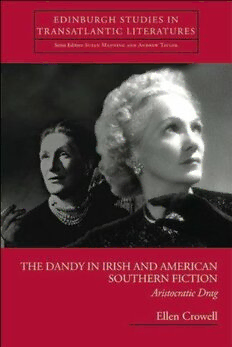
The Dandy in Irish and American Southern Fiction: Aristocratic Drag PDF
217 Pages·2007·0.809 MB·English
Most books are stored in the elastic cloud where traffic is expensive. For this reason, we have a limit on daily download.
Preview The Dandy in Irish and American Southern Fiction: Aristocratic Drag
Description:
This book identifies and interprets the longstanding ideological and aesthetic dialogue between the literary imaginations of Anglo-Ireland and the Anglo-American South. It offers a rich comparative examination of nineteenth- and twentieth-century Irish and American Southern plantation literatures and their respective representations of race and nation, gender and sexuality, region and landscape, and the gothic imagination. Pairing major writers from both traditions, including Maria Edgeworth, William Faulkner, Oscar Wilde, Katherine Anne Porter and Elizabeth Bowen, the book shows how this transatlantic dialogue coalesced around questions of power, supremacy, and gentility: writers in Anglo-Irish and Anglo-Southern literary traditions recognized and spoke to each other through the discourse of aristocracy. As the book demonstrates, from the early nineteenth-century onwards, Irish and Anglo-Southern writers conducted a sustained exploration into constructions of aristocracy through the figure of the dissipated, deviant gentleman (or lady): the dandy. By augmenting literary analysis with a variety of historical, biographical, archival and visual materials, including nineteenth-century trade cards, original letters, and twentieth-century photographic portraits, the book offers readers a wide-ranging, interdisciplinary illumination of transatlantic modernism.
See more
The list of books you might like
Most books are stored in the elastic cloud where traffic is expensive. For this reason, we have a limit on daily download.
